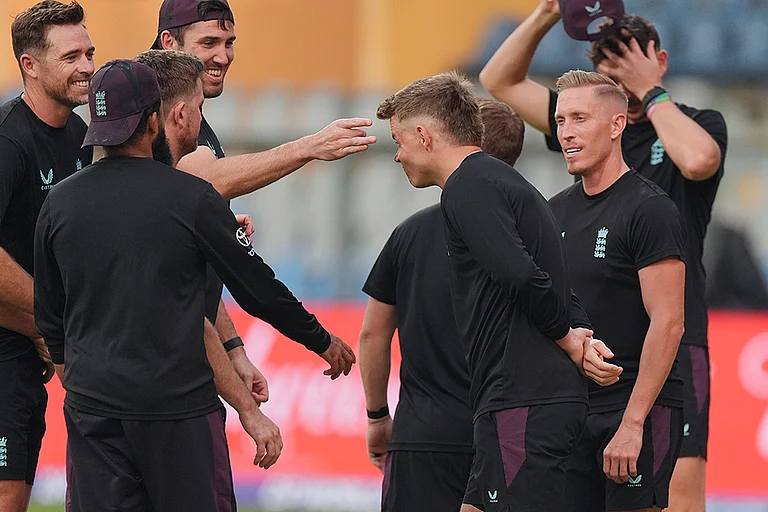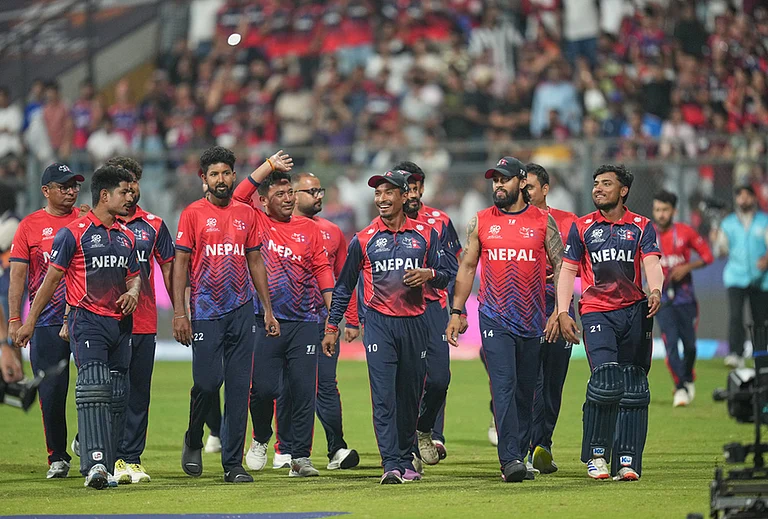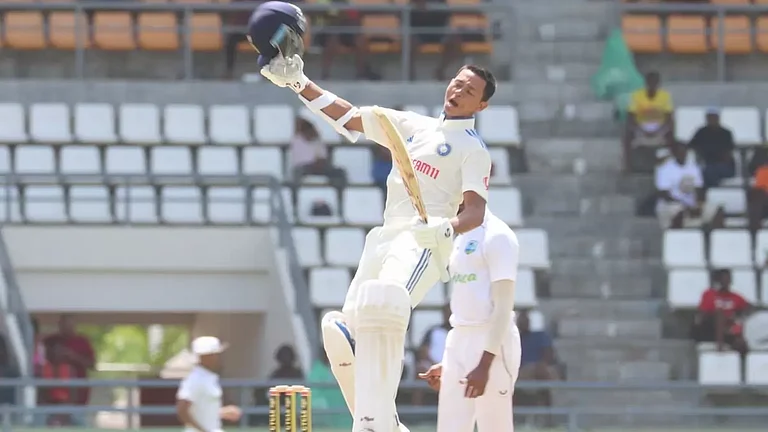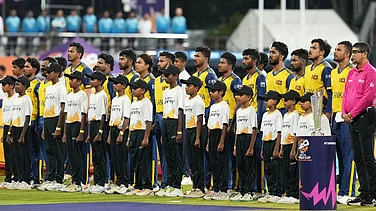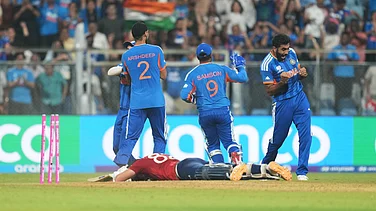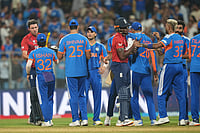Jwala Singh always knew that Yashasvi Jaiswal was special. "I was eagerly waiting for him that day, I don't know why," said Singh, recollecting the day they met for the first time at his place in Mumbai. Jaiswal, then a scrawny little boy, brought with him his most prized possession -- a collection of newspaper clippings. (Full IPL Coverage | More Cricket News)
That happened in December 2013. A chance meeting at a nets session in one of the many Azad Maidan pitches opened the doors for Jaiswal. Fast forward a decade, Jaiswal is on the cusp of greatness. From jostling to get net time in Indian cricket's cauldron to taking on the likes of James Anderson in Test cricket's elaborate settings, the left-handed opener has tasted his fair share of fame and fortune.
Now 22, he shares dressing rooms with the stalwarts of the game and can afford to live a luxurious life. At the hallowed grounds across the world, the youngster continues to plunder runs, be it in India colours or for Rajasthan Royals in the Indian Premier League. He is touted as the future of Indian cricket.

Akin to any other success story, his also has many apocryphal anecdotes, though only adding gloss to the enduring tale of sacrifice. It's a fact that he arrived in Mumbai to chase his cricket dream as a mere 10-year-old, and it continues to serve as the backstory to one of the most riveting cricketing recitals of these times.
But unbeknown to many, the 'Jaiswal journey', in reality, was already taking shape some seven years before his birth in 2001, not so far from his village in Suriyawan, Uttar Pradesh. That's one part which gets a passing mention, at best.

In Gorakhpur, a young Jwala Singh somehow managed to convince his parents that his future lies in cricket, not in academics, and representing the national team was his dream. Youngest of three brothers, he always wanted to go to Mumbai because in Gorakhpur there were “no such opportunities” where he could get good training and also exposure.
"So, I started talking to my parents that I want to go to Mumbai and become a player," Singh told Outlook India in an exclusive interview. "I dreamt of getting trained under [Ramakant] Achrekar sir. That's how I dreamt to become a cricketer and play for India."
Born to Tej Pratap and Sheela, Jwala Singh was a gifted all-rounder. As a 12-year-old, without any contact, he moved to Mumbai in 1994 after a lot of convincing. "Those days, there was no internet, no mobile phones. So, it was very difficult. Also, we were struggling financially. My father was a veterinary doctor and he got paid around INR 6,000 per month.
"I told my father to give me two years and promised him that I will definitely play well and do something good. So, I came to Mumbai with the help of one of my big supporters, Subhash Maurya. I was twelve-and-a-half years old, and had just finished my seventh standard."
Thus started a journey of struggles and sacrifices. Jwala Singh would spend days searching for Achrekar. "Finally, I found a person who knew the address of Achrekar. I went to his place. I met Kalpana madam (Achrekar's daughter). She asked, 'What do you want?'"
“I said, 'I want to become a player.' She said, 'You are a small boy. How can you stay here alone?' I replied, 'I can manage',” Singh relived his experience. "Anyway, Achrekar sir wasn't there. So, I went back to Gorakhpur, then after a few weeks I returned to Mumbai with my father."
Recounting the first meeting with Achrekar, Singh revealed that he initially failed to convince the famous coach but his persistence paid off. Singh needed to enroll in a school to stay and play in Mumbai.
"Achrekar sir was looking at my body and he was in doubt that how will this guy stay in Mumbai. But he took me to a school and arranged a meeting with the principal. She also had apprehensions about taking me. Actually, I was from a Hindi medium background and the school was English medium. She must have thought that I would not be able to cope with the transition."
"She then politely asked me to come next year. Probably, she didn't want to tell me the exact reason directly. I was very disappointed. As we were leaving the school, Achrekar sir said: ‘Yes, you came to practise with me. Now, if you are not getting admission how can I help you? Come next year’."
"As we headed our separate ways, I didn't know what was happening in my mind, suddenly I told my father, ‘Please give me two minutes’. I went to Achrekar sir and asked him, 'Sir, you came for me, can I walk with you to your house?' He said, 'No, I can go alone'. Then I said, 'Sir, I came from so far away and you didn't even see my game. If you see my game and give me some tips, and then decide whether I should go back or not, that would really satisfy me’."
"He said, 'Fine, come to the ground in the evening at five o'clock at Shivaji Park. I will see you play'. So I went in the evening, and he told me to bat for some time. Then he said, 'Okay, fine'. He went to my father and told him, 'Don't take your son back. I will make sure that he gets the admission and stays here.'"
A new chapter in Indian cricket's history was written there. For Jwala Singh though, it was the start of new challenges. He got selected for the Vengsarkar Cricket Academy and was also named in the Mumbai under-16 probables list.
Aware of his family's financial constraints, a young Singh explored avenues to get sponsors, and he did succeed in getting a few. But as fate would have it, his playing career was cut short and the dreams of playing for India remained unfulfilled.
"I often wondered about how to get sponsorship from people who love the sport. I went to more than 100 people, and everybody rejected me. But after around two years, Thakur Group of Companies started giving me INR 2,000 per month," Singh said.
"After school, Rizvi College offered me accommodation and my life became easy for some time, like one and a half years. But again, desperation was there, how quickly I could play at the higher level. So I was pushing myself, bowling fast.
"One day, I collapsed. A lot of coaches advised me. Sandeep Patil sir used to say, 'You are doing overpractice. Someday you will get injured.' I didn't listen to them because I was desperate. And it was my fault.
"I got multiple muscle failures, my groin was injured, my back was injured, my shoulder was injured... because of overpractice and lack of proper diet. Then the journey became very difficult. I was used to getting financial support. But when people got to know that I wasn't playing because of injury, everybody pulled their hands back."
Things only got worse, forcing a once-promising player to forage for livelihood, becoming an uninvited guest, sleeping at gymnasiums et al. A bid to revive his playing career also didn't materialize.
"That life was very difficult. From 1999 to 2003, even I don't know where I stayed. No place to stay, no food. And my cricket was getting compromised because I was struggling a lot outside the ground," Singh confided. "I was forced to enter coaching to earn money. Then I had my shoulder surgery. I became fit again, and started playing again. But I wasn't able to bowl. I went to different states to revive my career. I went to Tripura. I went to Hyderabad."
One day in 2009, Jwala Singh got a call from his family. His father was diagnosed with cancer. And everything changed.
"I told my father, just come to Mumbai. I will make sure that you get treatment. By then I had some savings. He came on 16th September 2009. I got him admitted him to a hospital. But we couldn't save him.
"When he was dying, seeing his face, I was constantly reminded of what he used to say to me: 'Tumko Mumbai mai naam kamane ke liye bheja tha (I sent you to Mumbai to earn fame, make a name for yourself). That day, I made a promise to myself. I couldn't play for the national team but I will make an India player", Singh shared.
As fate would have it, Jwala Singh met Yashasvi Jaiswal in December 2013.
"I was just back from a trip to South Africa. Eager to see my players, I went to Azad Maidan without wasting time," Singh said. "My academy's game had just got over. While leaving the ground, I ran into a friend. He was watching a net practice."
"One right-hander was batting. He started complaining about the wicket, saying the groundsmen were not making good wickets and they were not working hard enough. Just after that, one lefty, a small kid, went in and he started playing well. I told my friend, 'It's up to the batter, how good the bowler is and how good the wicket is'."

"While we were talking, the kid finished his session and walked towards us, removing his helmet. I asked him, ‘Son, what is your name?' He said, 'Yashasvi Jaiswal'. Then I asked him: 'Where do you stay?' He replied, 'Sir, I live in the tent'."
"The discussion continued, and he started to open up, sharing his ordeal and that he scored a double hundred in a Harris Shield match last year. And I thought this kid was getting over smart and trying to impress me."
At the time, Jaiswal was in trouble. Besides struggling to live a decent life, his cricket future was in jeopardy after someone had forged a birth certificate, making him a Mumbaikar so that he could register with the local cricket association. That's a topic for another day.
"I gave him my card and told him, ‘Come to my place on Thursday at 11 am with your paper cuttings’. I assured him that if you are genuine, I will see what can be done."
And the rest, as they say, is history.




